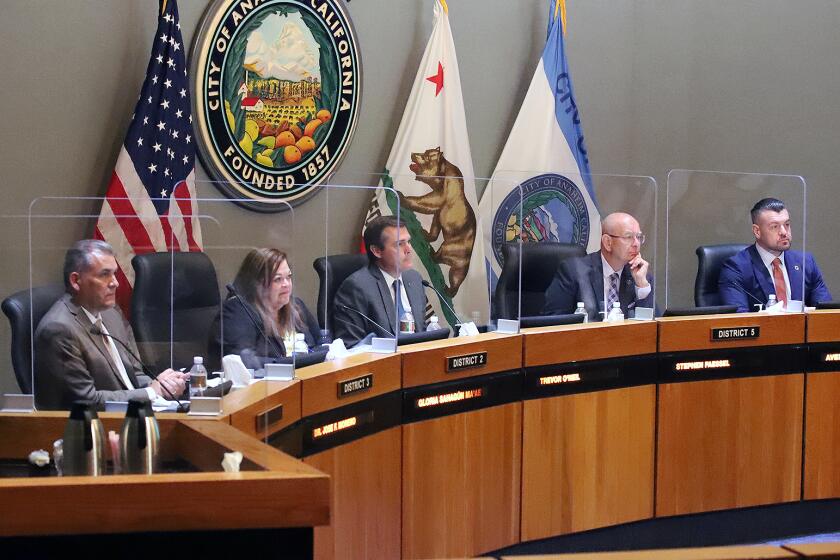Irvine Unified school board changes policy after ACLU accuses agency of violating free speech

- Share via
The Irvine Unified School District board modified portions of its policy this week after the American Civil Liberties Union accused the board of violating free speech principles.
The board voted in favor of the changes on Tuesday night about two weeks after it received a letter from the ACLU of Southern California contending that the Irvine school board violated 1st Amendment rights by enforcing Board Policy 9323, which is a set of rules for public meetings. In the May 24 letter, the civil rights group called for the board to repeal or alter the policy.
The letter addresses the instance of a specific resident, Debra Kamm, whose email was allegedly blocked in March by the school district after she submitted a complaint about discrimination against children with disabilities. Kamm attempted to address the issue in front of the board in mid-April and May but was reprimanded by board president Ira Glasky because she was in violation of board policy, the letter says.
“Recent enforcement of these rules at IUSD board meetings, along with the board’s choice to respond to one constituent’s criticism by blocking all messages from her, suggest the board is engaged in a misguided attempt to insulate itself from public input and criticism,” the letter says.
The ACLU took umbrage with a few specific rules in the policy, including one that, according to the nonprofit legal firm, prevented residents from complaining about district employees at public meetings. Rather, the policy only allowed residents to submit their criticisms “to the superintendent and/or the board in writing, signed by the complainant.”
Another rule prohibited comments that “reflect adversely upon the racial, religious, economic or political views, character or motives of any person on the staff and board.” The board president also had the power to end a speaker’s comment time under that rule, according to the letter.
The last rule the ACLU took aim at required people who were addressing the board to provide their name and address.
“The rules of conduct, especially considered together with Mr. Glasky’s threat to ban Mrs. Kamm from addressing the board in the future, suggest an unacceptable pattern of silencing dissent and criticism,” the letter says. “Further, the board’s decision to block Mrs. Kamm in response to her raising concerns about matters of public interest indicates that the board is more concerned with avoiding unpleasant or embarrassing criticism than it is with hearing and taking seriously the public’s concerns.”
During Tuesday’s meeting, Glasky said that the board has “never prevented someone from speaking to the board who desired to do so.”
He continued: “Actually, we’ve gone out of our way to allocate additional time on important and controversial issues so that everyone has an opportunity to address [them], and I think that’s important. So any allegations or statements to the contrary that in fact we were limiting speeches, that’s just not accurate. However, policy needs to reflect what current law is, and so I appreciate the opportunity for us to do that.”
Anaheim City Council addressed a host of issues related to former mayor Harry Sidhu’s resignation and allegations of ‘cabal’ corruption.
The board modified a number of rules addressed by the ACLU, including the item requiring a name and address. The policy now states that “persons attending board meetings shall not be requested to sign in, complete a questionnaire, or otherwise provide their name or other information as a condition of attending the meeting.”
Despite the quick action from the school board, Zoë McKinney, an ACLU staff attorney specializing on the 1st Amendment, said over the phone on Wednesday that the modified policy still has some outstanding issues.
“They responded to our last letter really quickly,” she said. “So we appreciate that they were willing to revise and take a look at their own policies so quickly. In reading the new ones, it’s clear that the changes were made in an effort to protect free speech, the right to criticize and principles of access to government. But we think that the policies still fall short in a couple of ways.”
McKinney said that her major concern is that the modified policy now gives the president of the board complete discretion to determine whether a topic is appropriate or not.
“Which is just entirely too much discretion to give to one person,” she said. “It’s also really vague because I don’t know what ‘appropriate’ means in this context.”
McKinney also still has an issue with the part of the policy addressing the identification of speakers because the new rule doesn’t clarify that a person shouldn’t have to give their name in order to comment at the meeting. It states that individuals shouldn’t be required to provide that information as a condition of attending the meeting.
“We understand that just from an administrative perspective, in order to run a meeting, you have to have some sort of sign up for comment, but what other jurisdictions have done is put on the comment or speaker request card a clear statement that you are permitted to use a pseudonym in signing up,” McKinney said.
McKinney said she will convey her concerns to the school district this week.
All the latest on Orange County from Orange County.
Get our free TimesOC newsletter.
You may occasionally receive promotional content from the Daily Pilot.





